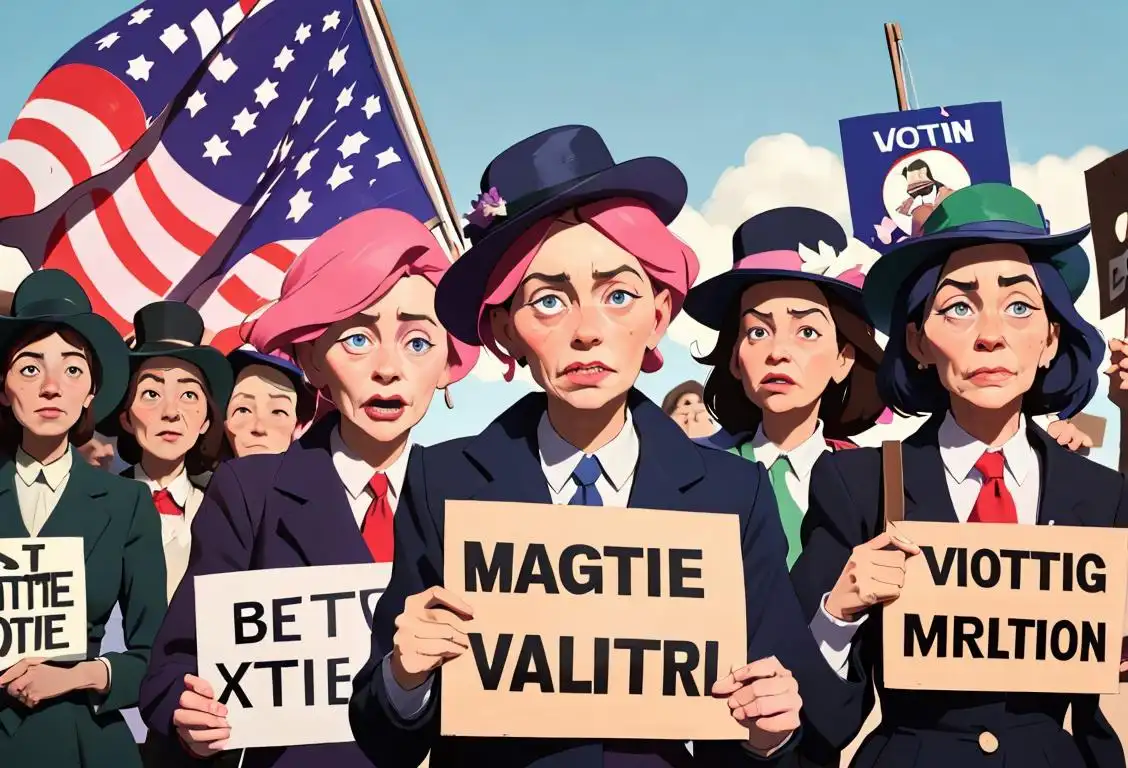National Voting Rights Day

Welcome to WhatNationalDayIsIt.com, where we uncover the fascinating history behind national days! Today, we're diving into the significance of National Voting Rights Day.
When is Voting Rights Day?
It's national voting rights day on the 17th August.
The Importance of National Voting Rights Day
On this auspicious day, we celebrate the hard-fought battle for equal voting rights and the power of democratic participation. National Voting Rights Day serves as a reminder of the struggles faced by marginalized communities throughout history, as they fought tooth and nail to have their voices heard at the ballot box.
The fight for voting rights has come a long way. It's a tale of both triumph and tragedy, with heroes, villains, and more than a few plot twists. From the suffragette movement to the civil rights era, countless individuals have given their all to ensure that every citizen's vote matters.
But let's not forget the present day. This isn't just about dusty history books and sepia-toned photographs. National Voting Rights Day is a reminder that our work is not yet done. It's a call to action for everyone to stay vigilant and protect the hard-won rights of the past.
So, on this significant day, take a moment to appreciate the right to vote. Register to vote if you haven't already, encourage others to do the same, and stand by the mantra that every voice counts.
History behind the term 'Voting Rights'
1787
Founding of the United States Constitution
The term 'voting rights' can be traced back to the founding of the United States Constitution in 1787. This was a pivotal moment in history, as it established the framework for the American government. The Constitution laid the foundation for the democratic principles of the United States, including the concept of voting rights. While the original Constitution did not explicitly state who had the right to vote, it set the stage for future discussions and debates about suffrage.
1790
Restrictions based on property ownership
In 1790, the term 'voting rights' took on new meaning as the first restrictions on voting were introduced in the United States. At this time, many states had laws that limited voting rights to individuals who owned property. This effectively excluded a significant portion of the population, including women, African Americans, and people who did not meet the property requirements. The concept of voting rights became associated with the struggle for equality and inclusivity.
1848
Seneca Falls Convention
The fight for voting rights gained momentum in 1848 with the Seneca Falls Convention. This landmark event in women's history marked the beginning of the women's suffrage movement in the United States. The convention, held in Seneca Falls, New York, focused on women's rights, including the right to vote. It was here that the term 'voting rights' became closely tied to the demand for gender equality in the political sphere.
1868
The 14th Amendment
The passage of the 14th Amendment to the United States Constitution in 1868 played a significant role in shaping the concept of voting rights. The amendment granted citizenship and equal protection under the law to all individuals born or naturalized in the United States. While it did not explicitly guarantee the right to vote, it laid the groundwork for future amendments that would address suffrage and expand voting rights for marginalized groups.
1920
Ratification of the 19th Amendment
The year 1920 witnessed a monumental event in the history of voting rights with the ratification of the 19th Amendment to the United States Constitution. This amendment granted women the right to vote, effectively expanding the scope of voting rights. The fight for women's suffrage had been a long and arduous one, and the ratification of the 19th Amendment marked a significant victory for the women's rights movement and brought voting rights closer to achieving inclusivity.
1965
The Voting Rights Act
In 1965, the United States took a major step towards ensuring equality in voting rights with the passage of the Voting Rights Act. This legislation aimed to overcome the barriers that prevented African Americans from exercising their right to vote. The act prohibited racial discrimination in voting practices, such as literacy tests and poll taxes, which were used to suppress minority voting. The Voting Rights Act of 1965 further solidified the concept of voting rights as a fundamental pillar of democracy and a tool for social change.
Did you know?
Did you know that the hashtag #RockTheVote was born in 1990 as a nonpartisan movement to encourage young people to get involved in politics? Its success led to over 2 million new voters being registered in just one year!Tagged
awareness funFirst identified
17th August 2015Most mentioned on
17th August 2015Total mentions
9Other days
Nurses Day
Former Prisoner Of War Recognition Day
Press Day
Handloom Day
Heroes Day
Memorial Day
Dance Day
Bestfriends Day
Liberation Day
Love Your Pet Day









